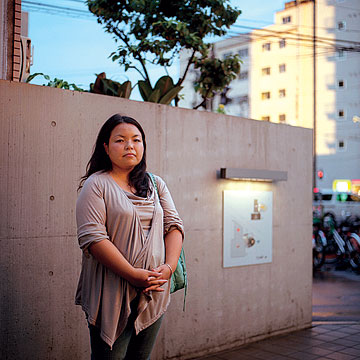
Setsuko Kanzaki, 31
Kanzaki's plan to keep working after having children makes her an anomaly — 70% of Japanese women don't work after becoming mothers. Despite the DPJ's child-friendly platform, she doubts the party's ability to bring real change
For Setsuko Kanzaki, 31, life is more about building on what she has already achieved. Just by planning to continue working after she has kids, Kanzaki is something of the odd woman out. It helps, of course, that she works in an all-female office of an American company in Tokyo under a manager who doesn't consider marriage and offspring a reason to quit one's job. But Japan's workplace is so devoid of family-friendly policies, like adequate maternity leave or day care, that a shocking 70% of women leave their jobs to give birth. Kanzaki criticizes Japan's postwar goals for having favored a race for middle-class comfort over the promotion of family values. "Concentrating on making money destroyed community and family relationships," she says. "We make money. So what? We feel empty."
If Japan is to continue its economic preeminence, it will have to help women like Kanzaki find the right work-family balance. Despite her international-economics degree and fluent English learned by watching the films of her favorite actor, Hugh Grant, Kanzaki is alienated, at least politically. She didn't vote in the recent Tokyo election because no party appealed to her. Even the DPJ's child-friendly platform didn't sway her, in part because she is disgusted by the continuing reports of funding scandals within the opposition party's leadership ranks. "The DPJ says change, the LDP says change, but nothing changes," Kanzaki says. "People are tired of listening."
Such frustration is familiar to Kyoichi Marukusu, a political-science professor at Tokyo's Mejiro University, whose recent class questionnaire found that students described themselves as "negative, indifferent and unable to see the future." But Marukusu knows that just complaining won't get the next generation very far. "I tell them if they don't voice their opinions," he says, "they will continue to be sacrificed." Japan's youth have a choice: Do they jump in or give in? The future of their country will depend on how many opt for the former.
— with reporting by Yuki Oda / Tokyo